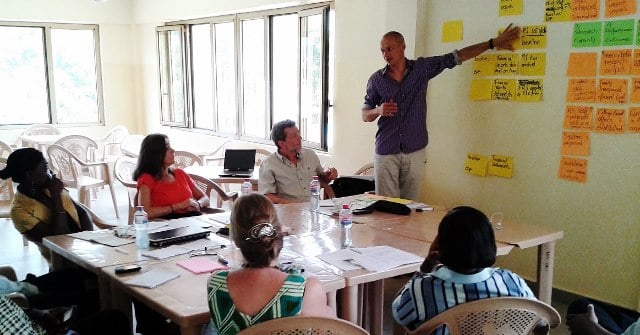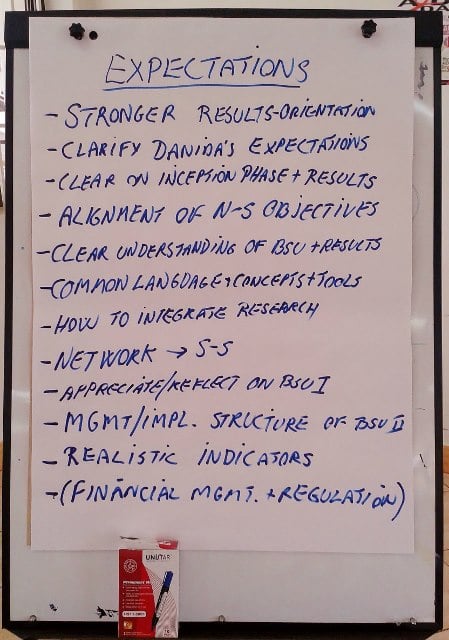Matchmaking
27-08-14

Text and photos: Lars Arne Jensen, DFC Research Project Administrator
The matchmaking has taken place during the recent months, and is still going on between universities in Denmark and universities in Ghana, Tanzania, Nepal and Uganda as you read these lines.
The background for these marriages/partnerships is that the second phase of the Building Stronger Universities programme (http://dfcentre.com/research/building-stronger-universities-bsu/) was launched this spring.
The matchmaking process
The initial activity for this has been a matchmaking process in which forming seven South-North partnerships between universities in the South and Danish partner consortia played a crucial role.
Unlike other partnerships in the world of research, these partnerships have been formed via a completely different approach.
In collaboration with Danida’s Technical Advisory Services and process consultant Mr. Nils Boesen the seven South universities prepared and submitted an individual project outline to Danida, stating their own key areas of research in which they wish to strengthen the research capacity.
These project outlines all enclosed a wide range of different research disciplines (e.g. health care, water, and natural resource management, agri-business value chains, aquaculture, ICT in education, institutional capacity building). Therefore, the Danish universities had to join forces to be able to respond to the project outline of the South. And to do this within such a wide range of disciplines in one application is highly unusual compared to standard procedures for open calls for applications.
Six proposals
The result of the matchmaking process is six incoming proposals, one for each South university project outline (except for Gulu University in Uganda, please see below). Most of the eight Danish Universities are represented in the proposals, with some universities represented in several proposals.
All of the six proposals have been approved by Danida as the basis for engaging into an inception phase, covering the period from June through August.
The process consultant has up to now facilitated this matchmaking process. During March, April and May the Danish consortia took their form, both via bi- and multilateral consultations amongst the interested parties – ‘The Usual Suspects’ you may call them – but also new actors entered the scene.
Workshops in Ghana, Tanzania and Nepal
As part of the process, monitoring/inception workshops have recently been carried out in Ghana, Tanzania and Nepal. These workshops have been very fruitful, especially in terms of giving the involved parties a chance to link up and adjust expectations as well as plan for the remainder of the inception phase.
At the workshop, Dr. Declare Mushi of Tanzania Kilimanjaro Christian Medical University College (KCMC) emphasized: “The workshop helped us to build network and team work spirit, and to develop common understanding of the project goals.”
As you can see from the keyword picture below, ‘Realistic Indicators’ and ‘Common Language, Concept and Tools’ were among the expected outcome, and indeed these keywords played a major role at all of the workshops.
As Dr. Elton Kisanga, KCMC BSU II Coordinator, expressed it: “The ‘Theory of Change’ and the log frame was a challenge to articulate at the beginning.”
The way forward
The six consortia are now in the process of finalizing the inception reports, outlining in details the actual activity and indicator framework for the coming two years, as the BSU II will run up to the end of November 2016.
After participating in the monitoring/inceptions workshops, DFC and Danida are confident that the South-North partnerships will manage to justify the total BSU II budget of DKK 100 million. Furthermore, the research and institutional capacity within the involved South universities will be substantially enhanced by the end of the BSU II. As the results emerge along the way, hopefully the BSU II successfully can pave the way for a BSU III in the years to come.
NB: The careful reader might notice that both the numbers ‘six’ and ‘seven’ are used in this article – this is due to the fact that the situation for Gulu University in Uganda for a while was not clarified with regards to the Danish Government’s decision on continuing research collaboration with state financed institutions. This has now been resolved, and the collaboration will continue.

The Seven Universities
University of Ghana & Kwame Nkrumah University of Science and Technology, Ghana
Sokoine University of Agriculture & Kilimanjaro Christian Medical University College & State University of Zanzibar, Tanzania
Gulu University, Uganda
Kathmandu University, Nepal
